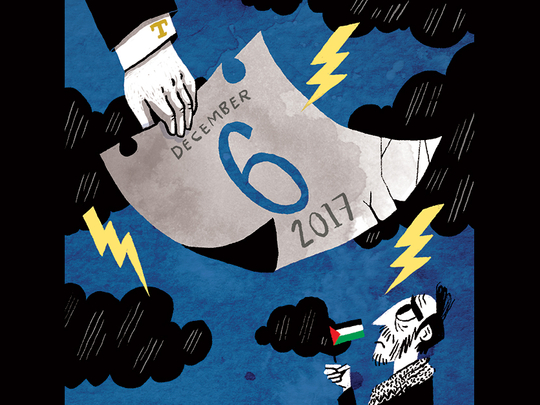
We are still in disbelief. We are still reeling from the decision by the American president to invalidate our rights in [occupied] Jerusalem, a city that for 13 centuries had been central to the religious consciousness of Muslims everywhere — a city in a country that since antiquity had codified the immemorial reflexes of the people of Palestine, whence they trace their roots as native sons.
Did US President Donald Trump give much thought to any of that when he so cavalierly decided, seemingly on whim, to give away something that was not his to give? Hardly. The mind dizzies at the brazenness of it all.
All of which takes us further afield where we need to ask this question: What is it about the serpentine — and yes, let’s say it, the racially-tinged — relationship that the Euro-American world has opted to have with Palestine and its people all these years, where the former was seen by it as eminent domain, subject to compulsory acquisition or gifting to others, and the latter as wretched “natives” not worthy even of holding a national name?
In this regard, recall how Britain, in its colonial heyday in 1917, issued the Balfour Declaration without much ado, behind the backs and against the pleas of the indigenous people, gifting the country to European Jews in order for these Jews to establish there a “national home”, while dismissing the Palestinians, who had lived there since time became time, as “the existing non-Jewish communities”. Almost exactly one hundred years later, the US enjoying its own heyday as a Big Power, followed the same well-trodden path, tampering with the political destiny of people who couldn’t fend for themselves or fight back.
Arthur Balfour and Trump may be separated by a hundred years, but the sentiment is the same in bot declarations, and the intent is just as egregious.
Meanwhile, leaders of the Jewish “national home” followed the advice of the founder of their colonist movement, Theodor Herzl, who envisioned the day, as he wrote in his book, Der Judenstaayt (1896), when “We shall spirit the penniless population [of Palestine] across the border ...” while a different, more sneaky fate awaited the affluent population. “Let the owners of the immovable property believe that they are cheating us, selling us things for more than they are worth”, he wrote, “but we will not sell them anything back.”
Imperceptibly at first, like a poison sifting silently into the bone, the Palestinians began to have their eclipse and the “Jewish home” its day, when the Palestinians, in our time, were reduced to a fragment of their humanity, stripped of power, land and any semblance of self-determination, their appeals for justice seen by Israel, along with its US enabler, as no more than the buzzing of an overwrought insect inviting a swatting.
This will not stand. And it will not stand because, very simply, you cannot fool all the people all the time.
As evidenced by its leaders’ reaction to Trump’s announcement on occupied Jerusalem, even Europe — once a bastion of support for the Zionist experiment in our part of the world — has shown that its patience has worn thin with Israel’s expansionist ambitions and messianic fantasies in that little sliver of land (18 per cent) left Palestinians after the dismemberment of their patrimony in 1948.
Evidence? Earlier this week, Israel’s Prime Minister Benjamin Netanyahu, while on an official visit to Europe, was given the cold shoulder when he appealed to European Union (EU) countries to follow on Washington’s heels and recognise occupied Jerusalem as Israel’s capital. Frederica Moghenni, the bloc’s foreign policy chief, effectively told him thanks, but no thanks. The EU, he was told, was “in full unity” behind the international consensus that sees occupied Jerusalem as the capital of Israel and Palestine, not the exclusive — not to mention exclusivist — capital of the former.
Additionally, now a wide section of the American people has already woken up to the realisation that yes, it is true, the Palestinians are indeed the injured party in this dispute, and that insufferable Zionists like Netanyahu (who was once barred by the then US secretary of state, George Schultz, from ever setting foot in the State Department), so convinced of their rectitude, have deceived them all along. And they don’t like it one bit. (Visit any campus in the US today and you’ll be struggling to find students who openly support Israel.) An increasing number of Americans have come to realise, in other words, that there is something missing in this whole sad business of conflict resolution as conducted by their government: Neutrality as a bedrock in arbitration.
And as far as Palestinians, Arabs and Muslims are concerned, Trump’s stance on occupied Jerusalem not only confirms their long-held doubts about the fitness of the US as an arbitrator of the conflict in the Holy Land, but confirms their suspicion that America is an actor promoting Israel’s interests in a way guaranteed to stoke, not resolve that conflict.
Most Americans of a certain age can recall exactly where they were and what they were doing on November 22, 1963, when the then US president, John F. Kennedy, was assassinated. Most Palestinians, Arabs and Muslims will remember December 6, 2017, as a day that will live in infamy.
Fawaz Turki is a journalist, lecturer and author based in Washington. He is the author of The Disinherited: Journal of a Palestinian Exile.









